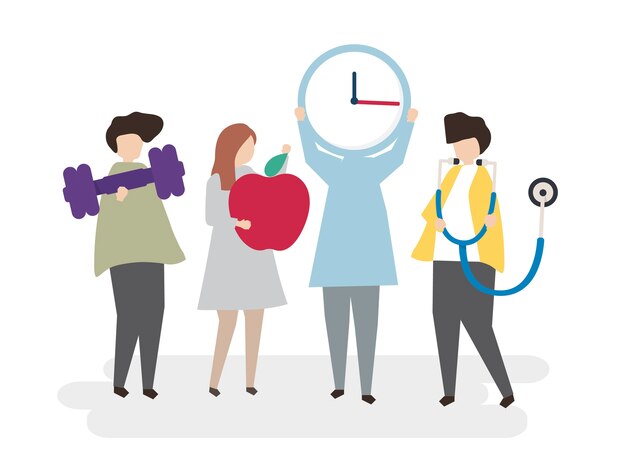Eating the right foods is only part of the equation. How and when you eat can also have a big impact on your health. Read this article to learn more.
Chrononutrition is a relatively new field of research that explores the relationship between our body’s natural rhythms and our diet. It is based on the idea that our bodies are designed to eat and sleep at certain times of day, and that eating at the wrong times can disrupt our natural rhythms and lead to health problems.
There is some evidence to support the idea of chrononutrition. For example, studies have shown that people who eat breakfast are more likely to maintain a healthy weight than those who skip breakfast. Additionally, studies have shown that eating dinner earlier in the evening can help to improve sleep quality.
Find more about this to know best about your diet and body.
What is Chrononutrition?
Chrononutrition is the study of how our body’s natural rhythm, the circadian rhythm, affects the way we metabolize and process nutrients. This rhythm controls many bodily functions, such as sleep-wake cycles, hormone production, and body temperature. Interestingly, our circadian rhythm also influences how our body reacts to the food we eat throughout the day.

How do our eating habits affect our body and blood sugar?
In order to know the game behind Chrononutrition, it is imperative to understand how your eating habits affect your body. Our eating habits significantly impact our body and blood sugar levels. Imagine our body as a finely tuned machine – the fuel we put in directly affects how it operates. Here’s a friendly breakdown of how it all works:
When we eat, our body breaks down the food into nutrients, including carbohydrates, which are turned into glucose, or blood sugar. This glucose is like the energy currency for our cells – it’s what keeps us going throughout the day. But here’s the catch: not all foods are created equal when it comes to blood sugar.
Eating foods high in refined sugars and simple carbs (like those delicious sugary treats) can cause a rapid spike in blood sugar levels. Think of it as a roller coaster ride – you go up quickly and come crashing down just as fast. This is teh real reason why your taste buds crave for sugar.
On the other hand, choosing foods rich in fiber, like whole grains, fruits, and veggies, helps keep your blood sugar steady. These foods release glucose slowly, providing a steady stream of energy without the sharp ups and downs.
But it’s not just about what we eat – how we eat matters too. If we gobble down a large meal in a hurry, our body might struggle to handle the sudden surge in glucose. Spacing out meals and snacks throughout the day helps maintain a more balanced blood sugar level.
And then there’s mindful eating – a game-changer! When we eat mindfully, we’re in tune with our body’s signals of hunger and fullness. We savor each bite, enjoy our food, and stop when we’re satisfied. This prevents overeating and gives our body time to process the glucose without overload.
So, the next time you sit down to a meal or grab a snack, remember that your choices matter. Opt for a mix of nutrients, choose whole foods over sugary ones, and give mindful eating a try. Your body will thank you with steady energy levels, better mood, and improved overall well-being.
Potential benefits of Chrononutrition
1. Weight Management
Emerging research suggests that the timing of our meals can influence weight management. The body’s metabolism and insulin sensitivity exhibit variations throughout the day. When insulin sensitivity is higher, consuming larger meals earlier in the day may aid in weight loss and maintenance. This approach could also contribute to better blood sugar control and reduced risk of type 2 diabetes.
2. Digestive Health
Aligning meal timing with our circadian rhythm can positively affect digestive health. Our digestive system operates optimally during the day, and consuming larger meals during daylight hours may promote efficient digestion and nutrient absorption. This contrasts with consuming heavy meals close to bedtime, which can disrupt digestion and potentially affect sleep quality.
3. Energy Levels
Meal timing has a direct impact on energy levels and overall vitality. A well-timed breakfast can provide the necessary energy boost to kickstart the day, while a balanced lunch maintains sustained energy levels. Avoiding large meals close to bedtime can prevent discomfort and support a restful night’s sleep.

What to do to improve your Chrononutrition?
1. Prioritize Breakfast
Begin your day with a nutrient-rich breakfast to jumpstart your metabolism and provide sustainable energy. Incorporate a balance of protein, healthy fats, and complex carbohydrates for optimal results.
2. Mindful Eating
Pay attention to your body’s hunger and fullness cues. Opt for smaller, well-balanced meals throughout the day to support steady energy levels and digestion.
3. Time-Restricted Eating
Consider adopting a time-restricted eating pattern, such as an early time-restricted feeding window, which involves consuming all meals within a specific timeframe (e.g., 8 am to 3 pm). This approach aligns with the body’s natural circadian rhythm and can have positive effects on metabolic health.
Conclusion
Chrononutrition is unveiling the intricate connection between meal timing and our overall health and well-being. By recognizing the impact of our circadian rhythm on nutrient metabolism and digestion, we can make informed dietary choices that enhance our vitality.
Whether you’re aiming for weight management, improved digestion, or sustained energy levels, embracing the principles of chrononutrition offers a novel approach to optimizing your health from the inside out.







Leave a Reply